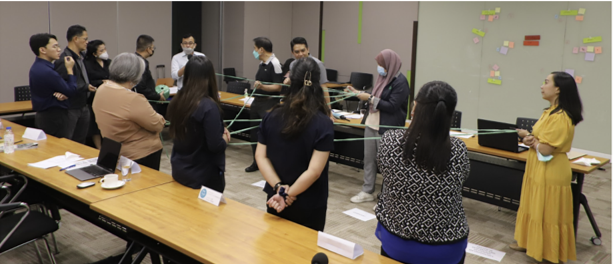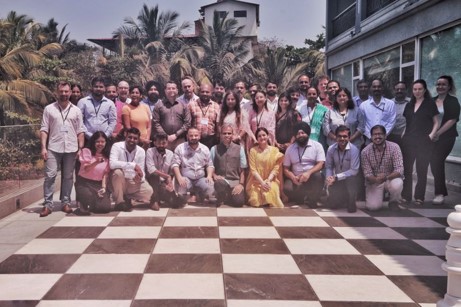Locally led development is when local actors, such as individuals, communities, networks, organizations, private institutions, and governments, set their agendas, develop solutions, and bring their capacity, leadership, and resources to make those solutions a reality.
In the Asia Region, there is a growing demand for cross-country and regional learning on health systems strengthening (HSS) to improve the capacity of domestic health policy and systems research institutions (HPSRIs) to strengthen their capacity, coordinate and enhance training, and position them to provide the government with guidance on domestic health policy reforms thereby reducing their reliance on global actors.
With support from USAID’s Asia Bureau, the Accelerator and the WHO Alliance collaborated to convene HSPRIs, training and learning platforms, and regional actors to develop a shared vision of what a strengthened locally-led ecosystem of actors in the Asia Region and identify priority activities to achieve the vision.
Following the co-creation series, six action groups were formed to focus on each of the priority activities, which resulted in the launch of four demand-driven pilots led by HPSRIs to enhance the health policy and systems research ecosystem in Asia. Together, these pilots advance the shared vision co-created by HPSRIs, learning platforms, and other key stakeholders and strengthen HPSRIs’ ability to meet local demand for evidence.
You can keep scrolling to learn how these local-led pilots tackle challenges in the Region.
Pilot 1: Health Systems Policy Research Institutions Regional Database
To increase collaboration, improve the update of evidence to action, and connect potential partner organizations, subject matter experts, and facilitators with learning platforms and training programs, the Center for Health Policy and Management and ACCESS Health is developing a database of Health Policy and Systems Research Institutions (HPSRIs) in the region. The database will not only connect HSPRIS, but it will also help identify capacity-strengthening gaps.
Help Build the Regional HPSRI Database
Pilot 2: Forum for Advancing Better HPSRIs

HERD International (Nepal) and the Alliance for Improving Health Outcomes (Philippines) are partnering with the Department of Health in the Philippines to map HPSRIs’ organizational attributes and develop a framework of organizational robustness. The findings will be used to design organizational capacity-strengthening sessions for HPSRIs in Nepal and the Philippines.
The pilot will result in an adaptable tool that can be used by HPSRIs throughout Asia to assess their resilience and to identify strategies to improve through training and other educational activities.
Progress To Date
- AIHO hosted a workshop in the Philippines to develop a framework to assess HPSRI robustness.
- HERD and AIHO held KIIs with HPSRIs in Nepal and the Philippines to understand how they view their role in the HPSR ecosystem and which capacities need strengthening.
- HERD held a panel on health policy and systems research at the National Summit of Health Nepal
- Nepal will hold two workshops in July to adapt the framework in their local context and further build on a universal framework with AIHO.
Pilot 3: Domestic Financing Framework
Seoul National University and P4H will develop a framework to assess domestic financing pathways for HPSR in Southeast Asia. The framework will be based on mixed-methods research and a participatory approach, using Thailand and Vietnam as case studies.
The aim is to provide HPSRIs with a better understanding of domestic financing mechanisms in their respective countries, leading to a more robust and locally-funded HPSR ecosystem that promotes evidence-driven policymaking.
Key Framework Questions
How do you define domestic funding?
How and by what means to you measure that funding?
How diverse are the funding sources?
What pros and cons are related to major funding sources?
How can you examine the adequacy and feasibility of funds?
How can each country determine the procedure and criteria to prioritize funding?
How can we evaluate the performance of domestic funding?
Progress To Date
- Seoul National University drafted an initial framework based on desk research and presented it to HPSRIs and government officials in Asia.
- Seoul National University has completed key stakeholder interviews in Cambodia, China, Thailand, and Vietnam. A research team led by Dr. Kwon is currently analyzing the data and updating the framework.
Pilot 4: Training and Learning Programs
The Institute for Health Policy in Sri Lanka will develop a twinned program that combines leadership development principles from Leadership for UHC (L4UHC) with technical content from the Asia-Pacific Network for Health Systems Strengthening. The pilot aims to align the operations and content of both programs and adapt learning modules on health systems knowledge. The modules will be tested in up to seven countries in the L4UHC program’s 2022/23 cycle.

The goal is to increase synergy and collaboration across training and learning programs, reduce duplication, and support the co-created vision of a stronger HPSR ecosystem continuously strengthened through sustainable capacity development efforts.
The India program successfully launched in April 2023 with delegations from four states (Kerala, Himachal Pradesh, Punjab, Jamun Kashmir) and the National Health Authority. ANHSS colleague Prof. Ajay Mahal (Melbourne University) also joined this first Module to support integration efforts.
Progress To Date
- Given diversity of needs and contexts, L4UHC anticipates splitting into two groups (northern states and then Kerala).
- Pilot team is now planning for Module 2 (August or September) and how Flagship material can be integrated before, during, or after that Module, including through remote and offline activities.
Looking Ahead
The Accelerator will support the pilots as a learning partner in 2023 to document the learnings and how they’re advancing the shared vision for a stronger HPSR ecosystem. In this capacity, the Accelerator supports collaborative problem-solving across pilots and documents how the activities build relationships among HPSRIs and strengthen their capacity to participate in the evidence-to-action cycle.
To follow each pilot’s journey, subscribe to our Google Group. Each pilot will share periodic updates along with a blog of key findings from implementation: AsiaHPSRstrengthening@googlegroups.com
The Accelerator will convene the community of HPSRIs, learning platforms, and development partners that co-created the shared vision in 2021 to revisit the vision and ensure it aligns. We are also surveying key stakeholders of the HPSRI ecosystem to assess additional priorities for ecosystem strengthening. We invite you to share your priorities by joining the Google Group.





